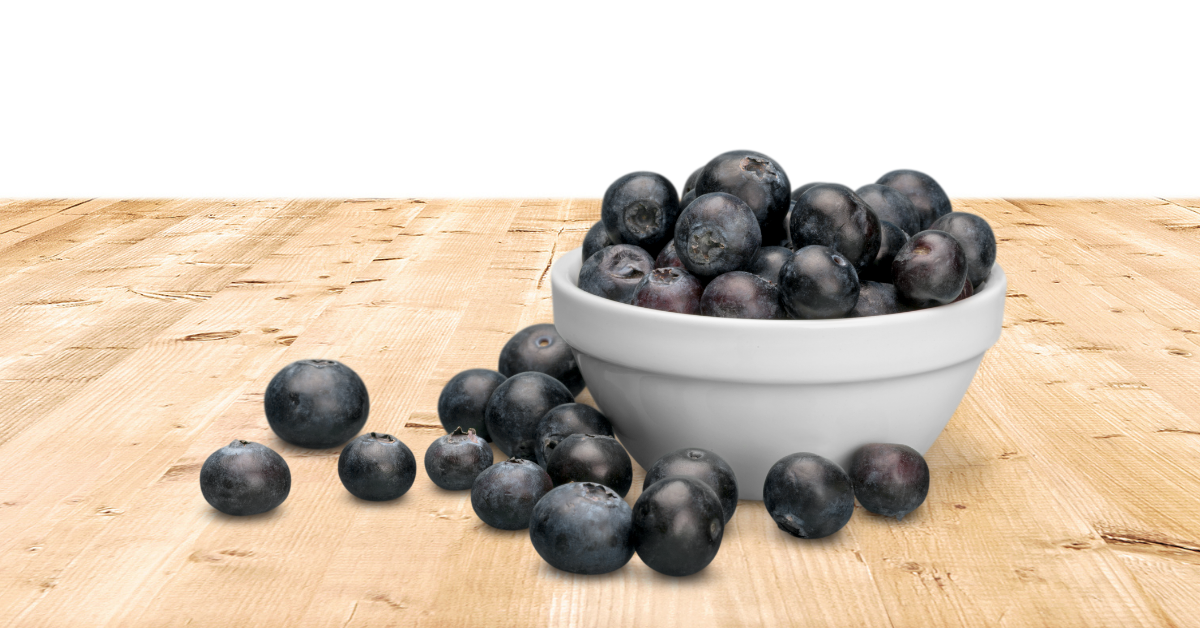
Can people with diabetes eat blueberries? The simple answer is yes. Here are the details and suggestions from a professional diabetes educator.
Diabetes Problem Foods, Pt. 13
Overall, fruits continue to alarm many people with diabetes (PWD) because of one word—sugar. Often, sugar is crossed off the list and substitutes are made, and certain foods are avoided, including fruits. Several years ago, one of my clients with type 1 diabetes avoided eating fruit. After becoming a detective of her eating and exercise habits, she realized that combining fruit with protein and dividing her servings of fruits over meals helped prevent blood sugar spikes. Her exercise routine also helped with maintaining her blood sugar levels, and at last, she started enjoying fruits again.
When I think of blueberries, I automatically think of either eating them by themselves, in a smoothie, or blueberry muffins. But, as with all foods, there are so many creative and healthy ways to enjoy the foods we love. Blueberries are usually harvested between early Spring and late Fall. And, if you are a blueberry fan, it's a great time to thinking about how you can creatively continue eating blueberries in your meal plan.
Can People With Diabetes Eat Blueberries?
This is a common question, and the answer is: Yes.
Balanced meals and following portion sizes are recommended for anyone diagnosed with diabetes or prediabetes, and those trying to prevent type 2 diabetes. You can purchase fresh blueberries in the store's produce section, the freezer section, or in canned forms. Blueberries are considered superfoods for their health benefits (what are superfoods? We break it down here). Other fruits that are considered superfruits are red grapes, cranberries, and blackberries.
History of Blueberries
Research suggests that blueberries were first cultivated in 1912 after many years of believing that blueberries could not be cultivated. Blueberries are second to strawberries in being the most produced berries in the United States. Since 2010, many states have expanded the blueberry season starting in early Spring through late Fall, in September. To increase awareness of blueberries, the blueberry industry has designated July as National Blueberry Month.
Blueberry Nutrition
Although blueberries are small in size, they are large in antioxidants (plant chemical compounds), fiber, potassium, and flavor. Research support that berries, including blueberries, support cardiovascular, digestive, and nervous system health, help prevent type 2 diabetes and support weight management...all of which are areas of concern for someone with diabetes or prediabetes. Keep in mind that fruits are most nutritious at harvest. The way blueberries are packaged and processed may cause slightly different nutritional data.
Nevertheless, one serving of blueberries is one cup. Blueberries are low fat (0.5g), sodium (1mg), and have a low glycemic index (approximately 40). Blueberries contain 114mg of potassium and 3.69g of fiber, which are inadequately consumed in American meal plans. A serving of blueberries also contains 21 grams of carbs (for energy), 1.1mg of protein, 24% of the daily recommendation of Vitamin C, and 2% of magnesium. Remember, when counting carbohydrates for dosing insulin, you can subtract half the total fiber from the total carb count to get net carbs. Although it is considered a carbohydrate, dietary fiber does not fully digest or raise blood sugar the same way as other carbohydrates.
Like all foods, inspect your blueberries and make sure they are uniform in color and firm. You can always keep up-to-date with food recalls via foodsafety.gov.
Blueberry Recipes
Academy of Nutrition and Dietetics:
- Blueberry and Spinach Smoothie is a nutritional powerhouse
- Berry and Barley Spinach Salad for some whole grains
Diabetic Gourmet:
- Almond Berry Muffins with fiber-rich ingredients
- Sugar-free Blueberry Bannock for a dessert with no added sugars

